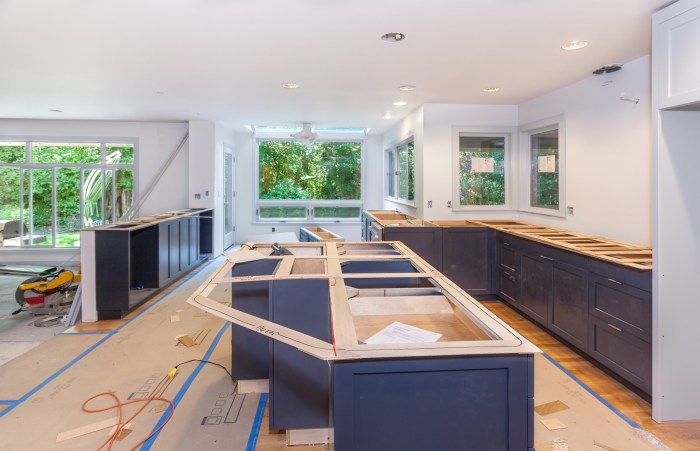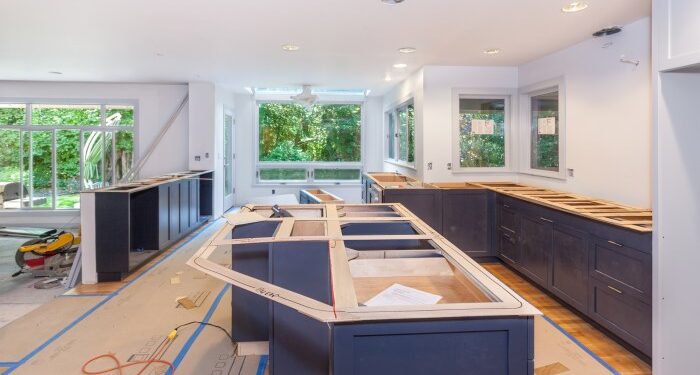Embark on a journey towards transforming your living space with full home renovation services. This comprehensive guide dives into the nuances of creating your dream home, from initial planning to material selection, ensuring a seamless and fulfilling renovation experience.
Overview of Full Home Renovation Services
Full home renovation services encompass a comprehensive approach to transforming a home by improving its functionality, aesthetics, and value. This involves upgrading various aspects of the property, including structural changes, interior and exterior design, and overall enhancement of the living space.
Opting for a full home renovation service offers numerous benefits to homeowners. It allows them to customize their living space according to their preferences and needs, creating a home that reflects their style and personality. Additionally, renovating the entire home at once can be more cost-effective and efficient compared to tackling individual projects over time.
Typical Process Involved in Full Home Renovation Services
When undertaking a full home renovation, the process usually involves several key steps to ensure a successful outcome:
- Initial Consultation: Discussing the homeowner's vision, budget, and timeline with the renovation contractor.
- Design Phase: Developing a detailed plan and layout for the renovation project, including material selection and architectural drawings.
- Permitting and Approvals: Obtaining necessary permits and approvals from local authorities before commencing the renovation work.
- Demolition and Construction: Removing existing structures and building new elements according to the design plan.
- Installation and Finishing: Installing fixtures, appliances, and finishes to complete the renovation project.
- Final Inspection: Conducting a thorough inspection to ensure that the renovation meets quality standards and building codes.
Planning Phase
Before embarking on a full home renovation project, proper planning is essential to ensure a smooth and successful outcome. This phase sets the foundation for the entire renovation process and helps in avoiding costly mistakes along the way.
Key Factors to Consider During the Planning Phase
- Define your goals: Clearly Artikel what you want to achieve with the renovation. Whether it's updating the look, increasing functionality, or enhancing energy efficiency, having specific goals will guide your decisions throughout the project.
- Evaluate your budget: Assess how much you can realistically afford to spend on the renovation. Consider factors such as materials, labor costs, permits, and unexpected expenses. It's crucial to set a budget that aligns with your goals and financial capabilities.
- Hire the right professionals: Engage with experienced contractors, architects, and designers who understand your vision and can help bring it to life. Research and interview multiple professionals to find the right fit for your project.
- Consider the timeline: Determine a realistic timeline for the renovation, taking into account any potential delays or complications that may arise. Setting a clear schedule will help you manage expectations and ensure the project stays on track.
- Obtain necessary permits: Check with your local authorities to determine what permits are required for your renovation project. Failing to secure the necessary permits can result in fines or legal issues down the line.
Tips on Creating a Realistic Budget for a Full Home Renovation
- Evaluate your finances: Take a close look at your current financial situation and determine how much you can comfortably allocate towards the renovation project. Consider factors such as savings, loans, and potential sources of funding.
- Get multiple quotes: Reach out to different contractors and suppliers to get accurate estimates for materials and labor costs. Comparing quotes will help you identify any discrepancies and ensure you're getting a fair price for the services you need.
- Factor in contingency funds: Set aside a portion of your budget for unexpected expenses or changes that may arise during the renovation process. Having a contingency fund will help you address any unforeseen issues without derailing the entire project.
- Prioritize your spending: Identify which aspects of the renovation are most important to you and allocate your budget accordingly. Focus on high-impact areas that align with your goals and make informed decisions about where to invest your money.
- Seek professional guidance: Consult with a financial advisor or renovation expert to help you create a realistic budget that accounts for all necessary expenses and ensures you stay within your financial limits.
Design and Concept Development
When it comes to a full home renovation, design plays a crucial role in transforming a space into a functional and aesthetically pleasing environment. Design not only focuses on the visual aspects of the renovation but also takes into consideration the practicality and functionality of the space.
Professional Collaboration with Clients
Design professionals work closely with clients to understand their vision, preferences, and requirements for the renovation project. Through consultations and discussions, designers gather information about the client's lifestyle, needs, and style preferences to create a concept that aligns with their expectations.
- Designers conduct on-site visits to assess the current space and identify potential opportunities for improvement.
- They collaborate with architects, contractors, and other professionals to ensure that the design concept is feasible and can be implemented effectively.
- Client feedback is incorporated throughout the design process to ensure that the final concept meets their expectations and requirements.
Popular Design Trends
In full home renovations, several popular design trends have emerged in recent years that focus on creating modern and functional living spaces. Some of these trends include:
- Open-concept layouts that promote a sense of spaciousness and connectivity between different areas of the home.
- Use of sustainable and eco-friendly materials to create a more environmentally conscious living environment.
- Integration of smart home technology for enhanced convenience and control over various aspects of the home, such as lighting, security, and temperature.
- Emphasis on natural light and ventilation to create bright and airy living spaces that promote well-being and comfort.
- Incorporation of versatile and multifunctional furniture pieces to maximize space utilization in smaller homes or apartments.
Construction Phase

In the construction phase of a full home renovation, the actual work begins to transform the design concepts into reality. This phase involves a series of stages that require precision, coordination, and expertise to ensure the successful completion of the project.
Stages of the Construction Phase:
- Demolition and Site Preparation: This stage involves tearing down existing structures, clearing the site, and preparing the area for construction.
- Structural Work: The next step is to carry out any necessary structural repairs, modifications, or additions to the home's framework.
- Mechanical, Electrical, and Plumbing (MEP) Installation: This stage focuses on installing or upgrading the essential systems to ensure the home's functionality and efficiency.
- Insulation and Drywall: Insulation is added for energy efficiency, followed by the installation of drywall to create the interior walls of the home.
- Finishes and Fixtures: The final stage involves adding finishes, such as flooring, paint, trim work, and installing fixtures like cabinets, countertops, and lighting.
The Importance of Skilled Contractors:
Skilled contractors play a crucial role in the construction phase of a full home renovation. Their expertise, experience, and attention to detail ensure that the work is done properly and up to code. Hiring skilled contractors can help prevent costly mistakes, delays, and rework, ultimately saving time and money in the long run.
Ensuring the Construction Phase Stays on Schedule:
To keep the construction phase on track and on schedule, effective project management is essential. This involves developing a detailed timeline, regular communication with contractors, suppliers, and other stakeholders, and addressing any issues or delays promptly. Additionally, having a buffer in the schedule for unexpected challenges or changes can help mitigate disruptions and keep the project moving forward smoothly.
Material Selection
When it comes to full home renovation, selecting the right materials is crucial to the success of the project. The materials you choose will not only impact the aesthetics of your home but also its durability, functionality, and overall value.
Making informed decisions about materials can make a significant difference in the outcome of your renovation.
Impact of Material Choices
Choosing the right materials can have a profound impact on the overall renovation project. For example, opting for high-quality, durable materials may require a larger initial investment but can save you money in the long run by reducing maintenance costs and increasing the lifespan of your home.
On the other hand, choosing cheaper, lower-quality materials may result in frequent repairs and replacements, ultimately costing you more in the long term.
Comparing Material Options
- For flooring: Consider options like hardwood, laminate, tile, or carpet based on the desired look, durability, and maintenance requirements.
- For countertops: Compare materials such as granite, quartz, marble, or butcher block for their durability, stain resistance, and aesthetic appeal.
- For cabinetry: Explore different materials like solid wood, plywood, or MDF to determine the best balance between cost and quality.
- For fixtures and hardware: Select finishes like chrome, brushed nickel, or oil-rubbed bronze to complement the overall design scheme of your home.
Budget Management
When embarking on a full home renovation, managing the budget effectively is crucial to ensure the project stays on track and within financial limits. By implementing smart strategies and making informed decisions, homeowners can make the most out of their renovation budget.
Prioritizing Spending
One key strategy in budget management during a full home renovation is to prioritize spending on areas that will have the most significant impact on the overall look and functionality of the home. This involves identifying essential upgrades or repairs that are non-negotiable and allocating a larger portion of the budget towards these aspects.
- Focus on structural repairs and improvements first to ensure the safety and integrity of the home.
- Invest in high-quality materials for areas that receive heavy daily use, such as kitchen countertops or bathroom fixtures.
- Consider allocating a portion of the budget for unexpected expenses or emergencies that may arise during the renovation process.
Cost-effective Alternatives
Another way to stay within budget during a full home renovation is to explore cost-effective alternatives without compromising on quality or style. By being resourceful and creative, homeowners can stretch their budget further and achieve the desired results without overspending.
- Consider refinishing existing cabinetry or furniture instead of replacing them entirely.
- Shop for discounted or clearance items for fixtures, appliances, and materials to save on costs.
- Explore DIY options for certain tasks, such as painting or minor repairs, to reduce labor costs.
Quality Assurance and Inspections

Quality assurance is a crucial aspect of a full home renovation as it ensures that the work meets high standards and is completed to the client's satisfaction. Inspections play a vital role in monitoring the progress of the renovation and identifying any potential issues that need to be addressed.
Importance of Quality Assurance
Quality assurance in a full home renovation helps to maintain consistency in workmanship, adhere to building codes and regulations, and deliver a final product that meets the client's expectations. It ensures that the renovation is completed with the highest level of craftsmanship and attention to detail.
Role of Inspections
- Inspections during the renovation process help to identify any deviations from the original plan, ensure that work is being done correctly, and catch any potential issues early on.
- Post-renovation inspections are essential to confirm that the work has been completed according to specifications, meets safety standards, and is ready for the client to move in.
Common Issues Found During Inspections
- Structural deficiencies such as cracks in walls or foundation issues.
- Poor workmanship like uneven flooring or improperly installed fixtures.
- Electrical or plumbing issues that may pose safety hazards.
Addressing these issues promptly and effectively is key to ensuring the quality and longevity of the renovation.
Post-Renovation Cleanup and Maintenance
After completing a full home renovation, it is essential to focus on post-renovation cleanup and maintenance to ensure the longevity of the newly renovated spaces. Proper cleaning and regular maintenance routines can help preserve the quality of the renovation work and keep your home looking fresh for years to come.
Cleanup Process
- Begin by removing any construction debris, dust, and leftover materials from the renovation site. This includes vacuuming, dusting, and sweeping all areas thoroughly.
- Wipe down surfaces such as countertops, cabinets, and floors with appropriate cleaning solutions to remove any dirt or grime accumulated during the renovation process.
- Deep clean carpets, upholstery, and curtains to eliminate any lingering dust or odors from the renovation work.
Maintenance Tips
- Regularly inspect and clean HVAC systems, filters, and vents to ensure proper airflow and efficient operation.
- Check for any signs of water damage, leaks, or mold growth in renovated spaces and address them promptly to prevent further damage.
- Keep up with routine maintenance tasks such as painting, sealing grout lines, and repairing any minor damages to surfaces to prevent deterioration over time.
Importance of Regular Maintenance
Regular maintenance is crucial in preserving the renovation work and ensuring that the investment made in the home improvement project pays off in the long run. By staying on top of cleaning and maintenance tasks, homeowners can prevent costly repairs and replacements down the line, ultimately extending the life of their renovated spaces.
Ending Remarks
As we conclude this exploration of full home renovation services, it's evident that meticulous planning, expert design, quality construction, and thoughtful maintenance are the pillars of a successful renovation project. Embrace the opportunity to revitalize your living spaces and create a home that reflects your unique style and vision.
Questions Often Asked
How do I create a realistic budget for a full home renovation?
Consider factors like the scope of work, materials, labor costs, and unexpected expenses. It's advisable to set aside a contingency fund for any unforeseen issues that may arise.
What are some cost-effective alternatives in the renovation process?
You can explore options like refinishing existing fixtures, repurposing materials, or opting for high-quality but budget-friendly alternatives to stay within your renovation budget.
Why is quality assurance important in a full home renovation?
Quality assurance ensures that the renovation meets your expectations and adheres to industry standards, helping prevent issues and ensuring long-term satisfaction with your renovated space.









